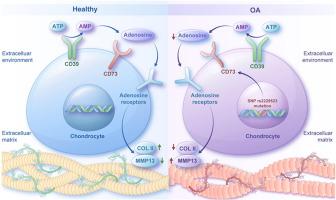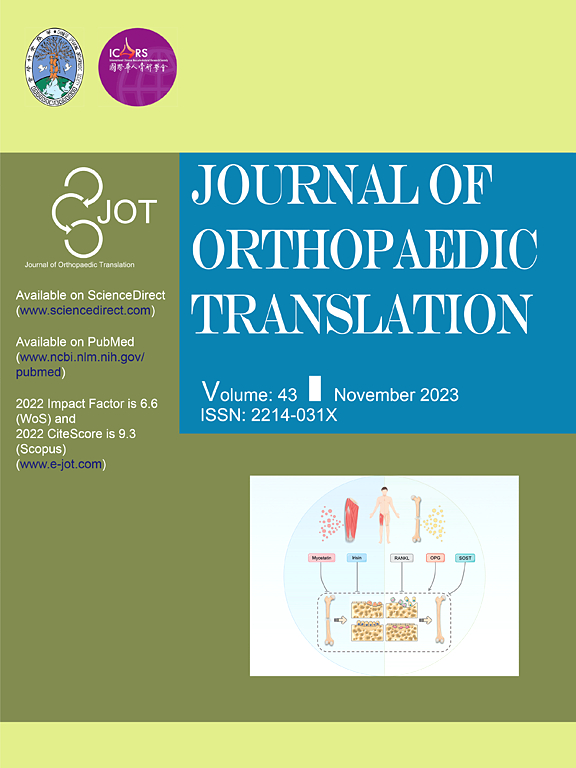CD73 alleviates osteoarthritis by maintaining anabolism and suppressing catabolism of chondrocytes extracellular matrix
IF 5.9
1区 医学
Q1 ORTHOPEDICS
引用次数: 0
Abstract
Background
Osteoarthritis (OA) is the most common degenerative joint disease, with articular cartilage degeneration as primary manifestation. Intra-articular injection of exogenous liposomal adenosine in mice knee has been shown to alleviate OA progression. However, the role of CD73, the rate-limiting enzyme of extracellular adenosine synthesis, in OA is still unknown.
Methods
In this work, we explored the expression changes of adenosine-related molecules via bioinformatic analysis. In addition, the expression level of these molecules was detected in OA cartilage. We also conducted a case–control study to investigate the genetic variants of selected SNPs on genes encoded adenosine-related molecules. To further explore the function of CD73 in chondrocytes, we knocked down the expression of CD73 with small interfering RNA and overexpressed CD73 with the use of lentivirus, and detected the expression of markers for anabolism and catabolism in mouse primary chondrocytes with or without IL-1β treatment. We also conducted in vivo experiments to explore the role of CD73 in OA.
Results
We found that the expression of CD73 was upregulated in OA, and the variants of SNP rs2229523 (base A to G) on NT5E (the encoding gene of CD73) were significantly higher in OA population, which might cause the amino acid encoded by this SNP change from threonine to alanine. The original helix structure in the adjacent region of amino acid encoded by SNP rs2229523 would be deconstructed after its mutation. Furthermore, we found that CD73 promoting the expression of Col2a1 but suppressing the expression of Mmp13 expression in mouse primary chondrocytes under inflammatory environment. The overexpression of CD73 attenuated bone remodeling and alleviated cartilage degeneration in DMM mice. Moreover, the physical activities were also improved in DMM mice overexpressed CD73 with the use of adeno-associated virus.
Conclusions
The variants of SNP rs2229523 (base A to G) on NT5E were significantly higher in OA population, and CD73 could alleviate OA by maintaining anabolism and suppressing catabolism of chondrocytes extracellular matrix.
The Translational Potential of this Article
This work showed that CD73 might be one of the biological therapeutic targets of OA, which would provide a reference for future novel treatment strategy of OA.

CD73 通过维持软骨细胞细胞外基质的合成代谢和抑制其分解代谢来缓解骨关节炎
背景骨关节炎(OA)是最常见的退行性关节疾病,主要表现为关节软骨退化。在小鼠膝关节内注射外源性脂质体腺苷已被证明能缓解 OA 的进展。本研究通过生物信息学分析探讨了腺苷相关分子的表达变化。此外,我们还检测了这些分子在 OA 软骨中的表达水平。我们还进行了一项病例对照研究,以调查编码腺苷相关分子的基因上所选 SNPs 的遗传变异。为了进一步探讨 CD73 在软骨细胞中的功能,我们用小干扰 RNA 敲低了 CD73 的表达,并用慢病毒过表达 CD73,检测了小鼠原代软骨细胞在接受或不接受 IL-1β 处理时合成代谢和分解代谢标志物的表达。结果我们发现,CD73在OA中表达上调,而CD73编码基因NT5E上的SNP rs2229523(碱基A变G)变异在OA人群中明显升高,这可能导致该SNP编码的氨基酸由苏氨酸变为丙氨酸。SNP rs2229523 编码的氨基酸邻近区域原有的螺旋结构在突变后将被解构。此外,我们还发现,在炎症环境下,CD73 可促进小鼠原代软骨细胞中 Col2a1 的表达,但抑制 Mmp13 的表达。过表达 CD73 可减轻 DMM 小鼠的骨重塑,缓解软骨退化。结论 在OA人群中,NT5E上的SNP rs2229523(碱基A到G)变异显著增高,CD73可通过维持软骨细胞细胞外基质的合成代谢和抑制分解代谢来缓解OA。本文的转化潜力这项研究表明,CD73可能是OA的生物学治疗靶点之一,这将为未来OA的新型治疗策略提供参考。
本文章由计算机程序翻译,如有差异,请以英文原文为准。
求助全文
约1分钟内获得全文
求助全文
来源期刊

Journal of Orthopaedic Translation
Medicine-Orthopedics and Sports Medicine
CiteScore
11.80
自引率
13.60%
发文量
91
审稿时长
29 days
期刊介绍:
The Journal of Orthopaedic Translation (JOT) is the official peer-reviewed, open access journal of the Chinese Speaking Orthopaedic Society (CSOS) and the International Chinese Musculoskeletal Research Society (ICMRS). It is published quarterly, in January, April, July and October, by Elsevier.
 求助内容:
求助内容: 应助结果提醒方式:
应助结果提醒方式:


